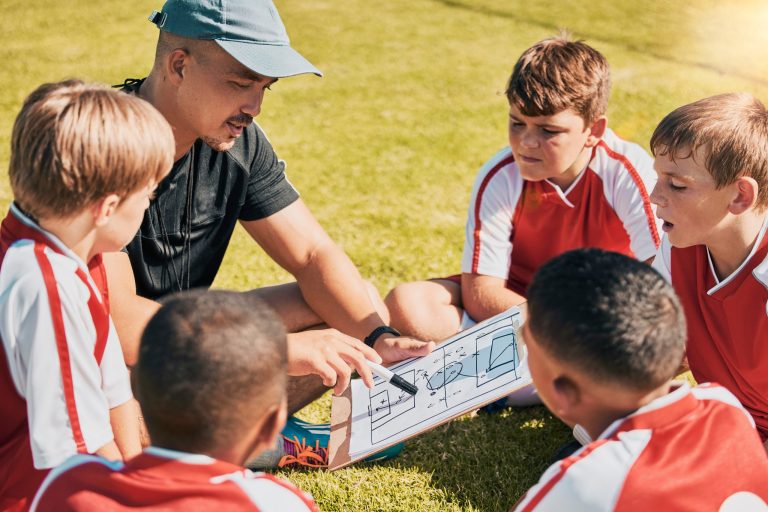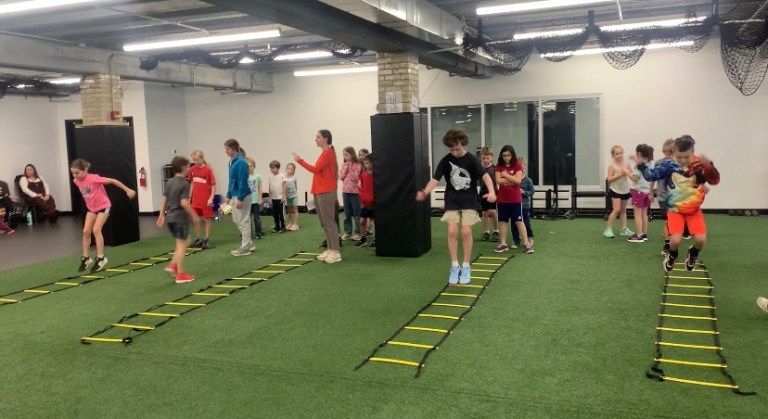Article
4 Ways To Be an Empathetic Athlete
Ground your relationships in compassion and empathy
Leon McKenzie
be an influencer
Sign up for all the latest articles, resources, and tools to help you grow as a leader on your team and in life.
The Scriptures are replete with verses that tout the value of friendship. Consider Ecclesiastes 4:12(NIV), “Though one may be overpowered, two can defend themselves. A cord of three strands is not quickly broken,” and Proverbs 27:6 (ESV), “Faithful are the wounds of a friend; profuse are the kisses of an enemy.”
Consider also the many pivotal friendships through which the Lord advanced His kingdom, like that of David and Jonathan, Ruth and Naomi, Paul and Timothy, Jesus and His disciples.
It’s also clear that friendship was a part of God’s plan for humanity since the very beginning of time. Back in Genesis when God was creating, over and over He joyfully exclaims that everything He made was good, except when it came to the loneliness of man. In that case, God concludes that it was not good.
Friendship or companionship would be God’s remedy for loneliness as He creates Eve, Adam’s wife and friend; a companion suited to end his loneliness.
Nearly 6,000 years later, give or take a millennia, it is still absolutely clear that loneliness is not good. In fact, it’s so terrible that it is the way prisons further punish criminals.
It seems that the only thing worse than sharing a tiny, one-room cell that has a rock-hard bunk and metal toilet/sink combo with another person is to be in an identical cell, alone. This is because, as studies have shown, loneliness has negative effects on the psyche and may even be the impetus for brain disorders, as well as, mental health disorders such as anxiety and depression.
So it’s not surprising that when people are struggling with their mental health, they’re likely wrestling with loneliness. Someone may ask at this point, “Could it be that the mental health issues they face produce their reclusiveness?” Maybe, but whether it is the chicken or the egg that comes first, a solution is necessary, and nothing cures loneliness better than friendship.
How many times have we heard the stories of people committing heinous crimes against others or harming themselves to the complete befuddlement of family members, school mates, coworkers or friends? Often we learn that before they do these things, they retreat, spending large amounts of time alone.
It’s because mental illness thrives in the darkness of loneliness, but the light of friendship produces an environment for healing. Through true friendships, those of us wrestling inwardly can share our struggles and find the help and support we need to thrive. Notice, however, that I said true friendships.
The kinds of friendships that produce health are those grounded in compassion and empathy; relationships through which someone who cares for you, comes alongside you, and shares a deep concern for what you are dealing with. The call here is four-fold:
Romans 12:15
Rejoice with those who rejoice, weep with those who weep.
DO NOT ISOLATE
If you are dealing with some sort of mental health issue like depression or anxiety, or maybe you’re struggling with your sexual identity or abuse or past trauma, please, do not retreat to the darkness of loneliness. Instead, find someone who cares for you and share what’s going on.
I understand that this is a risky endeavor. There’s no guarantee that those with whom you share your struggles will respond appropriately or that they will know the right things to say or do. But the risk is worth it.
When I was nine years old, my father died in quite dramatic fashion right in front of me on my bedroom floor. It’s enough to say that it was an extremely traumatic experience that left me with several scars. For a long time I secretly battled depression and anxiety.
I remember when I finally shared my secret struggle with my mother. Honestly, she didn’t know all of the right things to say nor did she quite understand the nature of what I was going through, but she cared enough about me to guide me toward someone who could help, and for that I am ever grateful.
When someone opens up about their struggles, listen.
PURSUE
Maybe you don’t struggle with mental health problems, but you recognize that someone you know is showing some of the signs that I talked about in this article. If so, consider approaching them and asking them some difficult questions about what’s going on. Ask very specific questions like, “Are you happy these days? Have you been depressed or feel like life’s hopeless?” And determine in your mind that no matter what they share, you will listen sincerely and only use what they say to help them and not to cause any greater harm.
During my sophomore basketball season in college, we had an especially talented group of freshman join our team. Unfortunately, these talented freshman were also particularly troubled. They seldom attended classes and when they did, they were disruptive and disengaged.
In order to get to the bottom of what was going on with them and to prevent them from throwing away their college careers, our coach asked a few of us older guys and captains to call a players-only team meeting.
During the meeting, he wanted us to challenge them to take our team and their education more seriously. Unsure how to do this, we decided to just ask questions and listen.
It wasn’t long before the most talented freshman, and one of the most talented athletes I’ve ever known, broke down in tears as he described the hopelessness he felt. He was leaving a home where it seemed like everything was riding on him to make things better, and he felt ill-suited for the task.
Afterward, each teammate began to open up about home and the struggles they were having. Before you know it, most of us were in tears as we shared our pain. This event solidified us as a team and that team made it to the national tournament for the first time in my school’s history.
Empathy is quite possibly the most effective weapon against loneliness and the diseases that thrive in its shadow. It was empathy that united us as a team and led to our success.
LISTEN
When someone opens up about their struggles, listen. Don’t allow your mind to wander to what you can do to fix it and to offer advice. Allow them the space to talk and even vent as much as they’d like. Understand that opening up that way is difficult and will likely leave them feeling vulnerable and raw.
Before anything else, seek to understand what’s going on with them, then respond with empathy; respond considering how you would have them respond to you if the tables were turned.
PRAY, PRAY, PRAY
Earlier in this article, I mentioned the struggles I had with depression and anxiety following my father’s death. That struggle persisted for some time, and while empathetic friendships were immensely helpful, the clouds never really broke until I experienced the eternal hope of the Lord Jesus.
While listening and talking me through dark times were helpful, the greatest thing my friends did for me was pray that the Lord would come in and overwhelm me with His love.
The best thing we can do for our friends who are going through hard times is pray. Pray for the ability to discern if and when your friends are having a tough time and need your help. Pray for the wisdom to know when to speak and what to say or when to be silent and just listen.
Pray for the resources and the connections to get them the best help available. Then pray that regardless of what you say or do or what avenues of help they pursue, your friends would so encounter Jesus and His incredible, gracious love, that the darkness of their pain and struggles would be obliterated by the brilliant light of the eternal hope that is ours through Jesus Christ.
READ THE LATEST
Where sport culture, relationships, character, identity, and faith collide.


